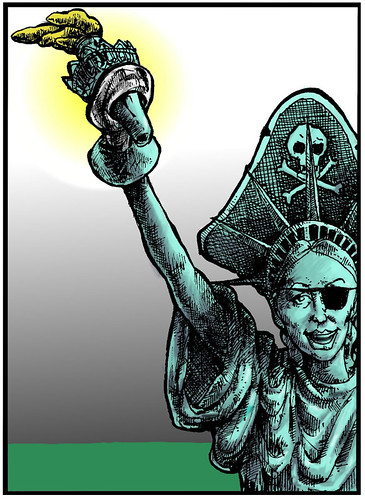Don't you see that the whole aim of Newspeak is to narrow the range of thought?
George Orwell (1949) 1984

There is such confusion in the American language, making political discussion increasingly difficult. In this story one word stands out, "liberalism".
Somehow in the United States, this wonderful word has been
hijacked, its oldspeak meaning thrown into the memory hole, preventing people from thinking clearly for lack of a better word.
It has become a mere euphemism in this country. This wonderful word, liberalism... a mere euphemism.
How do you explain it when people who call themselves "liberal" advocate
socialism ? Conservatives love this since then they can drag the word "liberal" through the mud of socialist disasters.
The end result? Well, Trey Parker and Matt Stone summed it up quite elegantly in the South Park episode
Douche and Turd, which aired just before the 2004 election. We are not alone. There are
Egyptian and
Russian variations on this theme, where people are presented a false choice between two factions.
So what's one to do? How can liberal parties grow in the United States? How can liberals argue for liberalism without a word to hang their hat on, without a word to have their conversations with, without a word to think with?
Back in 1955, Dean Russell from the Foundation for Economic Education (FEE) saw a way out.
He claimed the "good and honorable word 'libertarian'" for liberals to use ... to avoid confusion. To good advantage... for a while. Notice how Russell clearly defined "libertarian" to mean what the word "liberal" once meant.
So, as you may have noticed, this took off. The word libertarian has entered the lexicon. Everything is fine, right? Everyone understands that libertarians are for both economic and personal freedom, the Nolan chart, yada, yada, yada...
Well, not exactly. If you call yourself a libertarian, you now risk being confused for an anarchist. You're asked, "Don't you believe in government?"
How did this happen? Liberals believe in limited government. Liberty and anarchy are distinct. Liberals argue for the rule of law, not the rule of men.
Russell, himself, distinguished between anarchism and libertarianism in his book
Anything That's Peaceful. Brian Doherty, senior editor at Reason magazine, writes in his book on the history of the libertarian movement, "[Dean] Russell ... declared--both in private letters and in a Freeman article--that anarchists were positive enemies of human freedom, whether they knew it or not." (
Radicals for Capitalism, p. 320)
The experience of Russia, with its lack of rule of law, speaks volumes. So do fatwas.
Are we to await, yet again without word, for anarchists, now clothing themselves with a liberty word, to drag liberalism through the muck of their tax-free insanity?
I say no.
But what is there to do then?
Fortunately, there is the rest of the world. If you just peer over the borders, you will find that the word liberalism lives on happily in its meaningful sense.
Proof?
Read the essay,
Analysis of Conservative, Socialist and Liberal Paradigms, by Werner Hoyer, in
The Liberal Aerogramme, Issue 46, July 2003, pp. 28-32, a publication of the
Liberal International. I just discovered this organization last night via Gregory Yavlinkski's
website. Their
virtual hall of fame of liberal thinkers includes Hayek, Constant, Nozick, Mises, Popper, Bastiat, Rand, Humboldt, Wollstonecraft, and Williams.
Werner writes,
For the liberal, the central value is "freedom for the individual"--which explains why choice, tolerance, rule of law, civil and political rights, property and entrepreneurship are so important for liberals.
...
[A]ll liberals share a common denominator: they believe in putting freedom and the individual first. Another distinguishing feature of liberalism is that it distrusts decisions made on behalf of collective entities, whether these entities are nations, classes..., castes, religious groups..., or whatever. All such decisions tend towards arbitrariness in that they ignore differences within such an entity, overlook individual needs and create new injustices.
Fortunately the world is a big place, and liberalism lives on.
Update (Mar 7, 2007): Brian Doherty has written an excellent article today
Libertarianism: Past and Prospects, which is germane here. The anarchism I oppose is that which is oblivious to the art of a constitution and excuses the rule of men.
Update (Mar 9, 2007): In response to Brian Doherty's article, Brink Lindsey has written an excellent essay
Libertarians in an Unlibertarian World, in which he faces reality head on and concludes by calling for a "new political identity", "a genuinely liberal identity". Lindsey writes,
What needs to be developed is a set of ideas that can serve as the basis for a new political identity. Not a strictly libertarian identity – there simply aren’t enough strictly defined libertarians to base a mass political movement on. Rather, a genuinely liberal identity – one that brings together “fiscally conservative, socially liberal” voters from across the current left-right spectrum. One that recognizes a more expansive role for government than committed libertarians would like, but which nonetheless supports both economic and personal liberty. Here, then, is the way forward as I see it: to articulate an appropriately inclusive political vision that puts freedom at the center of its commitments.
This sounds a lot like Werner.
However, if unqualified, this approach is fraught with danger, in particular when you open the flood gates to "a more expansive role for government".
Principled lines must be drawn, where the presumption of liberty is not only
supported, but insisted upon.
 Update (Apr 9, 2007): Here
Update (Apr 9, 2007): Here's an entertaining outreach introduction to liberalism by Daniel Tourre of the Alternative Libérale in France. In it he distinguishes between liberalism, socialism, and conservatism, as I do. I particularly like how he starts it off with this wonderful Magritte painting
La condition Humaine.










